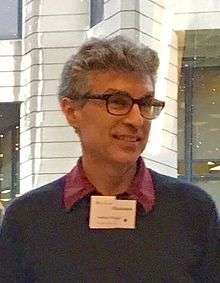Yoshua Bengio
| Yoshua Bengio | |
|---|---|
 Yoshua Bengio, October 27, 2016 | |
| Born |
1964 (age 53–54) France |
| Residence | Montreal, Quebec |
| Citizenship | Canada |
| Alma mater | McGill University |
| Known for | Deep Learning, Neural machine translation, Generative Adversarial Networks, Word embeddings, Denoising Auto-Encoders, neural language models, Curriculum Learning, Learning to learn |
| Scientific career | |
| Fields | Computer science |
| Institutions | Université de Montréal |
| Thesis | Artificial Neural Networks and their Application to Sequence Recognition (1991) |
| Doctoral advisor | Renato de Mori |
| Notable students | Ian Goodfellow, Hugo Larochelle, Pascal Vincent, Nicolas Chapados, Kyunghyun Cho, Antoine Bordes, Aaron Courville, Narjes Boufaden |
| Website | iro.umontreal.ca/~bengioy |
Yoshua Bengio (born 1964 in France) is a Canadian computer scientist, most noted for his work on artificial neural networks and deep learning.[1][2][3]
Bengio received his Bachelor of Engineering (electrical engineering), Master of Science (computer science) and PhD (computer science) from McGill University.[4] He was a post-doctoral fellow at MIT (under Michael I. Jordan) and AT&T Bell Labs.[5] Bengio has been a faculty member at the Université de Montréal since 1993, heads the MILA (Montreal Institute for Learning Algorithms) and is co-director of the Learning in Machines & Brains project of the Canadian Institute for Advanced Research.[4][5]
Along with Geoffrey Hinton and Yann Lecun, Bengio is considered one of the three people most responsible for the advancement of deep learning during the 1990s and 2000s.[6] Whereas the other two went to work for Google and Facebook respectively, Bengio has stayed in academia. Among the computer scientists with the largest h-index, Bengio is the one with the most recent citations per day.[7][8]
In October 2016, Bengio co-founded Element AI, a Montreal-based business incubator that seeks to transform artificial intelligence (AI) research into real-world business applications.[6] In May 2017, Bengio announced that he was joining Montreal-based legal tech startup Botler AI, as as a strategy adviser.[9]
Awards
In 2017, Bengio was named an Officer of the Order of Canada.[10] The same year, he was nominated Fellow of the Royal Society of Canada[11] and received the Marie-Victorin Quebec Prize.[12]
References
- ↑ Knight, Will (July 9, 2015). "IBM Pushes Deep Learning with a Watson Upgrade". MIT Technology Review. Retrieved July 31, 2016.
- ↑ LeCun, Yann; Bengio, Yoshua; Hinton, Geoffrey (2015). "Deep learning". Nature. 521 (7553): 436–444. doi:10.1038/nature14539. PMID 26017442.
- ↑ Bergen, Mark; Wagner, Kurt (July 15, 2015). "Welcome to the AI Conspiracy: The 'Canadian Mafia' Behind Tech's Latest Craze". Recode. Retrieved July 31, 2016.
- 1 2 "Yoshua Bengio". Profiles. Canadian Institute For Advanced Research. Retrieved July 31, 2016.
- 1 2 Bengio, Yoshua. "CV". Département d'informatique et de recherche opérationnelle. Université de Montréal. Retrieved July 31, 2016.
- 1 2 Metz, Cade (2016-10-26). "AI Pioneer Yoshua Bengio Is Launching Element.AI, a Deep-Learning Incubator". WIRED. Retrieved 2018-09-07.
- ↑ "Yoshua Bengio, the computer scientist with the most recent citations per day". MILA. September 1, 2018. Retrieved October 1, 2018.
- ↑ "Computer science researchers with the highest rate of recent citations (Google Scholar) among those with the largest h-index". University of Montreal. September 6, 2018. Retrieved October 1, 2018.
- ↑ "A Trump Dividend for Canada? Maybe in Its A.I. Industry". Retrieved 2018-10-11.
- ↑ "Order of Canada honorees desire a better country". The Globe and Mail. June 30, 2017.
- ↑ "Royal Society of Canada". December 16, 2017.
- ↑ "Prix du Quebec". December 16, 2017.
External links
| Wikimedia Commons has media related to Yoshua Bengio. |